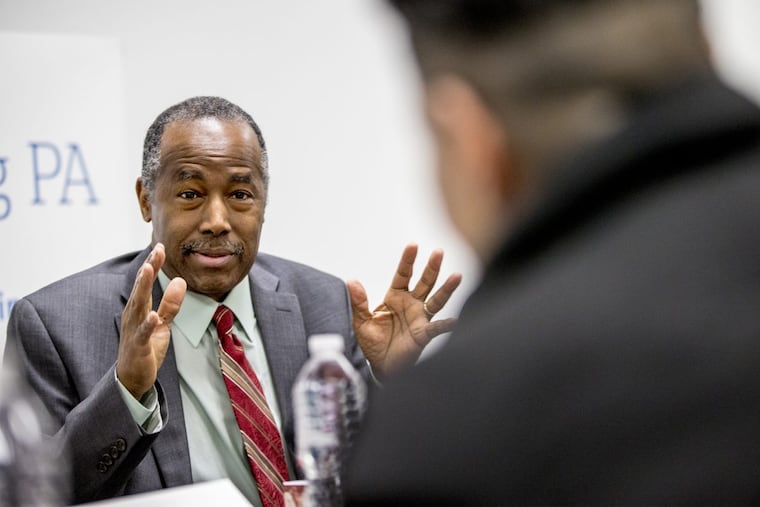HUD Secretary Carson visits unique Philadelphia housing program for people in opioid addiction
HUD Secretary Ben Carson said that housing security was one of his agency's major priorities: "We're starting to learn it costs less to society to take care of people than not to take care of people."

Housing and Urban Development Secretary Ben Carson smiled Wednesday as he listened to a woman tell of how she escaped homelessness after two years on the streets — thanks to a HUD-funded Philadelphia program designed to rapidly house people with opioid addiction.
"What's really encouraging," he said, "is to see how many people are willing to reach out and extend a helping hand. If we just learn how to help each other, my goodness, I can't even begin to imagine how wonderful things could be. We just have to learn how to do it."
It was the kind of upbeat message he would repeat throughout a round-table session with participants and staffers from Pathways to Housing, which follows a housing-first model. It does not require that its participants enter treatment or get sober before they can move into an apartment. Pathways will help residents get into treatment if they want, as well as assisting them with their finances, obtaining health care, getting therapy, and integrating into the community.
Carson's remarks were light on policy — he spoke mostly about the importance of community ties and working together — but full of praise for the program. He said housing security was one of his agency's major priorities: "We're starting to learn it costs less to society to take care of people than not to take care of people." After a tour of Pathways' offices in Logan, he spoke for about 20 minutes with participants and left without taking questions from reporters.
Matt Tice, Pathways' clinical service director, said the staff had been pleasantly surprised when Carson's team asked for a tour. They welcomed the opportunity to show off a program that they say is one of just a few like it in the United States.
In the year that it's been in operation, about half of program participants have entered treatment or abstained from using drugs. The city is hoping to expand the program as part of a plan to address the four heroin encampments along Lehigh Avenue in Kensington, the epicenter of Philadelphia's opioid crisis.
"If it wasn't for them, I might be dead," Norma Cuevas told Carson on Wednesday. She had been homeless for two years, and got her key to a new apartment on the day she finished a prison sentence. "What a feeling, when they showed me that key," she said, and spoke of the pride, security, and hope her apartment has given her. She's been in treatment for opioid addiction for a year, and said she was beginning to feel like "her old self" again.
Carson's visit is his second to the city in the last six months; during his September trip to an elementary school in Sharswood and a veterans' housing program in Center City, he also touted housing-first practices. Though President Trump's proposed budget includes deep cuts to HUD, it called for a slight increase in funding to the grant program that funds Pathways to Housing for fiscal year 2019. The spending bill Congress passed last week, which funds the government through September, also increased that line item.
Carson praised Trump for declaring the opioid crisis a national emergency. But city officials have said the declaration hasn't meant additional funding on the local level. Trump's plan to fight the epidemic, released this month, doesn't mention housing-first programs. The president has largely focused on addressing the crisis through harsher sentencing laws, including the death penalty for some drug dealers.
Tice said he hopes housing-first policies become part of the wider conversation on addressing the opioid epidemic.
"Having something that is inclusive and thoughtful and supportive is going to be a really important way to counter the crisis. If we're restricting people, if we're eliminating things, if we're throwing out people that are stigmatized, it's only going to push people to the margins," he said.